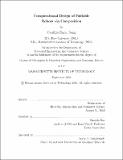| dc.contributor.advisor | Daniela Rus. | en_US |
| dc.contributor.author | Sung, Cynthia Rueyi | en_US |
| dc.contributor.other | Massachusetts Institute of Technology. Department of Electrical Engineering and Computer Science. | en_US |
| dc.date.accessioned | 2018-02-16T19:27:37Z | |
| dc.date.available | 2018-02-16T19:27:37Z | |
| dc.date.copyright | 2016 | en_US |
| dc.date.issued | 2016 | en_US |
| dc.identifier.uri | http://hdl.handle.net/1721.1/113734 | |
| dc.description | Thesis: Ph. D., Massachusetts Institute of Technology, Department of Electrical Engineering and Computer Science, 2016. | en_US |
| dc.description | This electronic version was submitted by the student author. The certified thesis is available in the Institute Archives and Special Collections. | en_US |
| dc.description | Cataloged from student-submitted PDF version of thesis. | en_US |
| dc.description | Includes bibliographical references (pages 175-192). | en_US |
| dc.description.abstract | Recent advances in rapid fabrication technologies have given designers the ability to manufacture increasingly complex geometries with little increase in cost, making it easier than ever to build a robot. However, the process of designing a functional robot remains challenging. Robots are complex systems that tightly integrate mechanical, electrical, and software subsystems. As a result, traditional robot development often requires iterations of design and testing to ensure that the result is both functional and manufacturable. This thesis explores intuitive design tools for robot design and proposes composition as a design approach. We leverage a print-and-fold paradigm of manufacturing, which has been shown to enable functional robots to be created within a day. The main challenge in using composition is that in general, even if two modules function correctly individually, the combination of the two may not be a valid design. We therefore develop algorithms and systems for robot composition that guarantee validity of the design geometry and that check the resulting kinematics. Our main contributions include a database containing parameterized designs for printable joints and mechanisms, algorithms for composition of fold patterns and motion sequences that guarantee no self-intersection, automated generation of fabrication plans for multiple modes of print-and-fold fabrication, an interactive user interface in which users can compose custom robots and receive real-time feedback about their designs, and experimental verification in the form of functional mechanisms and robots. The results provide designers with a framework for rapid design exploration and bring us closer to a future of easy robot design and customization. | en_US |
| dc.description.statementofresponsibility | by Cynthia Rueyi Sung. | en_US |
| dc.format.extent | 192 pages | en_US |
| dc.language.iso | eng | en_US |
| dc.publisher | Massachusetts Institute of Technology | en_US |
| dc.rights | MIT theses are protected by copyright. They may be viewed, downloaded, or printed from this source but further reproduction or distribution in any format is prohibited without written permission. | en_US |
| dc.rights.uri | http://dspace.mit.edu/handle/1721.1/7582 | en_US |
| dc.subject | Electrical Engineering and Computer Science. | en_US |
| dc.title | Computational design of foldable robots via composition | en_US |
| dc.type | Thesis | en_US |
| dc.description.degree | Ph. D. | en_US |
| dc.contributor.department | Massachusetts Institute of Technology. Department of Electrical Engineering and Computer Science | |
| dc.identifier.oclc | 1022850336 | en_US |
